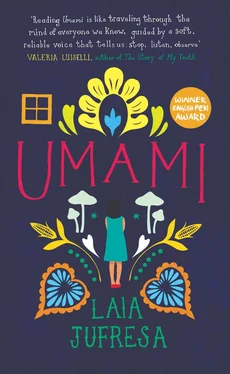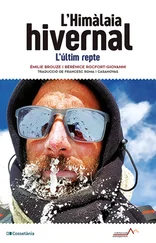This childhood memory soon smothers her little craving. (‘Be alert to the signs,’ the nurses told her, ‘salivating, rumbling tummy…’) Unlike appetite, she can recognize anger now. Her mouth tastes sour just thinking about the restaurant kitchen and the sweet smell of her dad’s happy hour.
‘Unstable childhood?’ repeated Marina, genuinely surprised by her therapist’s question.
Not unstable, no. Everything was timetabled; everything had a name. After Happy Hour came Client Time — the orders, the smells, the sound of conversations bouncing off the walls, her father treating the cooks like crap, the dirty plates, the leftovers. When the clients left it was Closing Time — the waiting staff turning the chairs upside down, her father singing, doling out tips and little pats on butts, the cooks changing into their normal clothes, and some of them, on more than one occasion and while the others kept guard at the door, flashing Marina parts of their anatomy that she’d rather not have seen. Then, every single day, at around eleven p.m., they would all leave and Dad would get out his hipflask, which he carried around in his apron, and serve himself what was left in a highball glass. It was His Time, ‘because he’d earned it’. Apart from on Mondays. On Mondays he was ‘going to change’. There was even stability in his broken resolutions.
The sour taste in her mouth makes her feel a certain pride for being alert, for noticing these things. Before the brain-washing, she didn’t even know where her sternum was. More than once she’d punched herself there; a beneficial punch, but purely intuitive. Now everything has a scientific name. The place where the knot is is called The Sternum, and if she feels she wants to cry but can’t, she is to massage it firmly: ‘No need for punching, Miss Mendoza.’ The sour taste is caused by Stress Hormones. Then again, it may just be her cigarette. She drops it in a bottle and goes back into the kitchen. Attempt number two.
‘Cravings are discreet, you have to be alert to them,’ the nurses would say. ‘The brain is like a puppy.’
One of the nurses didn’t shave her armpits and secretly Marina longed for her to be fired, to confirm that she wasn’t the only one to fuck up everything through physical self-neglect.
In fact, what those ‘alternative’ nurses were really saying was, ‘The brain is flexible: we can train it!’ and it was Marina who would automatically think, ‘Like a lapdog!’ But ever since she came home and her mom left her on her own again, little by little she’s been softening, trying out the advice she always rejected. She wants a Play-Doh brain, one that lets her imitate the self-respect she recognizes in other people, the same way she already imitates their way of talking and laughing and dressing. A ‘chewing-gum personality’ is what she calls this tendency of hers to mimic whatever or whomever she has in front of her. She talks like her classmates and gesticulates like Linda. If she spends a few nights in a row with Chihuahua she wakes up with a little northern-Mexican lilt, drawing out her syllables at random. Then Saturday comes around and she has to go and look after the kids, and by Sunday she’s talking like Olmo, who has a new habit of saying everything twice: ‘yes yes’, ‘no no’, ‘why why’, ‘I know I know’.
Marina distrusts her own malleability and is attracted by the possibility of its opposite: the fascinating and at the same time terrifying prospect of being someone. Someone complex yet clear-cut. Like Linda. Like her landlord. An adult, if you like, although she knows it’s not exactly that. It’s something else: to have an incontestable persona. To be someone about whom people say: ‘typical’, ‘of course she did’, ‘that’s so Marina Mendoza’. But no one has ever said those things about her, because she is many people at once, and all of them go equally unnoticed. It annoys her that her therapist doesn’t understand this basic deficiency of hers, this absolute absence of definition. It’s something he should help her to work through, not urge her to ignore. Instead, over and over again, he asks her to be herself. He says it as if ‘herself’ were something solid, unequivocal, a marble bust in a park somewhere.
There’s certainly something stony about the concept of selfhood; something that leaves Marina cold. Not indifferent, but insensible. She finds nothing in her swampy insides to connect ‘selfhood’ with. The only thing she’s come across to gain some mastery of the whole issue is to think about it in English. Yes, instead of the Spanish yo misma , ‘self’ works for her. Succinct and detachable, in English the term sounds like somebody else’s name: ‘Marina, meet Self.’
*
Lately, some nights, before falling asleep, Marina tries out some of the affirmations suggested by her therapist. She tends to stop after a minute because she struggles repeating the same thing over and again, and all too soon the affirmations turn into something else entirely.
‘I am a beautiful and productive woman; I am an artist. I am a fruitful and defective woman; I am an artiste. I am a fearful and resentful zoo-man; I am a sadist. I am a dutiful representative of batshit; I am batshit, I am zoo shit. I am a fruity loopy arsonist.’
Affirmations were obligatory at the ‘alternative’ hospital and had to be performed out loud for the ever-supportive staff. They made it sound easy:
‘Now all we’re going to do is simply repeat the same positive thought ten times before bed.’
And by ‘we’ they meant ‘you’. Not wanting to give in to those enlightened nurses, Marina prayed instead. She didn’t know any others apart from the Lord’s Prayer, and only bits of it at that, but that’s what she repeated. By the second round the whole thing would start to degenerate into free verse: ‘Our Father, who art in Devon, halloweened be thy name. Your whiskey gone, you will be prone to bursts of laughter and rage. Give us this day our daily taste of fasting, and forgive us our thefts as we forgive your bad taste. Our Father, who art incompetent, hollowed be thy name, your fiascos come, give us each day our daily fail, and forgive us our lack of hunger, forgive our breath if it comes out stale. Your wisdom come, I will be gone…’
The night nurses made sure to praise Marina’s creativity, and then proceeded to recite her affirmations for her, in a whisper.
‘You are an artist,’ they’d repeat ten times, and Marina would cover her ears like a little girl. Although every now and again, once they’d left, a little smile would spread across her face.
Since then she’s realized that she actually enjoys affirming things, and making them up even more so. It’s just repeating the same thing over and over that seems unbearably sad to her.
‘I’m a blue cheese,’ she affirms. ‘I’m a blugheese.’
‘Third time lucky,’ she affirms. ‘You have to lure the cravings with details.’
The flavor. The flavor was so rich it would go straight to her brain, like a chili, though not spicy. She liked the texture, like butter but better, slower in the mouth, with more lumps, smooth and explosive. She pictures the cheese for so long it starts to repulse her. Then she goes out to the yard, takes a deep breath, leans against the water tank and looks up to the sky.
‘Go-back-to-your-room!’ some part of her drawls.
Where was he now? In the restaurant, maybe, or holding Mom’s hands: ‘Don’t-bite-your-nails-Mother.’
She breathes how they showed her to. She looks up to the sky how they showed her to. It’s a stubborn dark gray color: it’s never fully night in the mews. Years ago, Marina invented the word graycholy. It might be the first color she ever invented: a bit gray, a bit melancholy. And yet, that wasn’t the shade of a fake night like this, but rather of a foggy afternoon in Xalapa, one of thousands. This big city’s sky is something else, with its blanket of electric light emitting a sort of sonic-luminous fusion: a low, droning ‘brrrrrr’. What’s it called, then? Darktric, maybe. Is it ever really night in Mexico City? Marina never goes far enough out of her comfort zone to be able to confirm such a thing. Maybe if you go up one of those skyscrapers they say exist in the business district you can escape the darktric, leave it all below, look up to the black sky again and see the darkness as it was meant to be: without the buzz, and interrupted only by stars. Marina lights a cigarette and holds it up as a satellite. There are a few loose butts next to an ashtray on the window ledge, no doubt left there by Chihuahua who likes to stand alone out in the yard from time to time, to make himself seem interesting. Marina loses her appetite when she smokes, and the truth is that that’s both why she started and why she quit. And now she’s waiting for it to reappear, the hunger, and she hasn’t mentioned to the doctors that she’s smoking again. The therapist swears her appetite will come back.
Читать дальше












